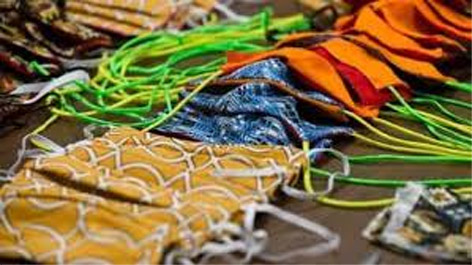TOTONTO, May 27: Cloth masks, particularly those with several layers of cotton fabric, can block droplet and aerosol contamination of the environment, and may reduce transmission of COVID-19, according to a new research.
Scientists, including those from McMaster University in Canada, said most virus transmission occurs via larger particles in secretions like droplets, generated while speaking, coughing, or sneezing, and some are created when water evaporates from these droplets, turning them into aerosol-sized particles.
According to the review research, published in the journal Annals of Internal Medicine, every virus-laden particle retained in a mask is not available to hang in the air as an aerosol, or fall to a surface to be later picked up by touch.
Direct evidence about whether wearing a mask made of any material outside a health-care setting reduces transmission of COVID-19 is lacking, said study first author Catherine Clase from McMaster University.
She explained that the point of wearing masks is not that some particles can penetrate, but that every virus-laden particle retained in a mask is not available to hang in the air or fall to a surface to be later picked up by another person.
“Although no direct evidence indicates that cloth masks are effective in reducing transmission of SARS-CoV-2, the evidence that they reduce contamination of air and surfaces is convincing and should suffice to inform policy decisions on their use in this pandemic pending further research,” the researchers noted.
In the study, they examined a century of evidence including recent data, and found strong evidence showing that cloth masks can reduce contamination of air and surfaces.
Based on the review research, Clase said cloth masks can block even aerosol-sized particles.
She said a mask made of three layers (muslin-flannel-muslin) reduced surface contamination by 99 per cent, total airborne microorganisms by 99 percent, and bacteria recovered from aerosol-sized particles by 88 to 99 per cent.
The study noted that a commercial mask which is made of four-layer cotton muslin can reduce all particles by 99 per cent, compared with 96 per cent to 99 per cent for contemporary disposable medical masks.
Even for aerosols, Clase and her team believe that cloth masks are comparable with medical masks.
While the filtration of cloth is variable with single layers of scarf, sweatshirt and t-shirt keeping away particles in the 10 to 40 per cent range, the scientists said multiple layers increase efficiency.
Citing previous studies, the researchers said some combinations of cloth such as cotton-flannel, block more than 90 per cent of particles.
In terms of making masks, it is important to realise that more layers will give more protection, both inward and outward, but will make it harder to breathe, Clase said, adding that children under two and people with breathing difficulties may not find these masks comfortable.
She believes that more research is needed into the best materials and design of cloth masks, to help the many people who are sewing masks to protect people in their community.
“Given the severity of this pandemic and the difficulty of control, we suggest that the possible benefit of a modest reduction in transmission likely outweighs the possibility of harm,” Clase said. (PTI)
Trending Now
E-Paper


